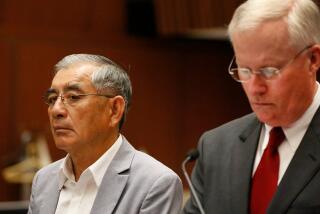Meese Still Not Complying With U.S. Ethics Laws, Congress Told : Agency Assumes Some of Blame for ‘Honest Mistake’
- Share via
WASHINGTON — Atty. Gen. Edwin Meese III still hasn’t complied with federal ethics laws, despite his year-late disclosure Monday of the details of his investments with a businessman involved in the Wedtech Corp. scandal, Congress was told today.
Meese also incorrectly listed the name of his partnership on his financial disclosure form a year ago, David Martin, director of the Office of Government Ethics, testified.
If the attorney general had given the accurate name of the partnership--Meese Partners, instead of Financial Management International Inc.--that would have “triggered an automatic review” within the ethics office and probably would have led to Meese’s being required to disclose his investments a year ago, Martin said.
“It would have made a difference” if the attorney general had accurately listed the Meese Partners name, Martin told Sen. Carl Levin (D-Mich.), chairman of the Senate Subcommittee on Oversight of Government Management.
$40,000 Profit in 19 Months
The correct name wasn’t revealed until Monday, when Meese’s attorneys disclosed, after a public furor over his ethics, that the attorney general had made nearly $40,000 in profits in 19 months through highly speculative one-day stock trades on a total investment of $54,500.
Meese referred to the investment with former Wedtech director W. Franklyn Chinn on his financial disclosure forms for 1985 and 1986 simply as an investment in Financial Management International Inc., the name of Chinn’s firm.
After his testimony, Martin refused to criticize Meese, despite the attorney general’s attack on the ethics office director earlier this week in which he accused Martin of violating federal law by first telling Rep. Gerry Sikorski (D-Minn.), rather than Meese directly, about problems with his financial disclosure form.
“I’m saddened by” Meese’s accusation, Martin said, adding that “I’ve not violated federal law.”
‘An Honest Mistake’
Martin repeatedly testified that his own ethics office is partly to blame because one of his analysts made “an honest mistake” by incorrectly concluding last year that Meese’s investment with Chinn was “some sort of pooled arrangement” similar to a mutual fund that did not require detailed financial disclosure.
Martin’s office resumed the review of Meese’s finances in April when Chinn’s connection to Wedtech became the subject of news stories.
“We did not catch the limited blind partnership . . . until it became notorious,” Martin said. “That is a fault of my office.”
Martin said Meese made “a good-faith attempt” to comply with ethics requirements with his disclosure this week.
However, he said Meese is required to list the amounts of money invested in each of the 23 one-day stock trades in order for him to be in compliance with federal ethics laws.
More to Read
Inside the business of entertainment
The Wide Shot brings you news, analysis and insights on everything from streaming wars to production — and what it all means for the future.
You may occasionally receive promotional content from the Los Angeles Times.










